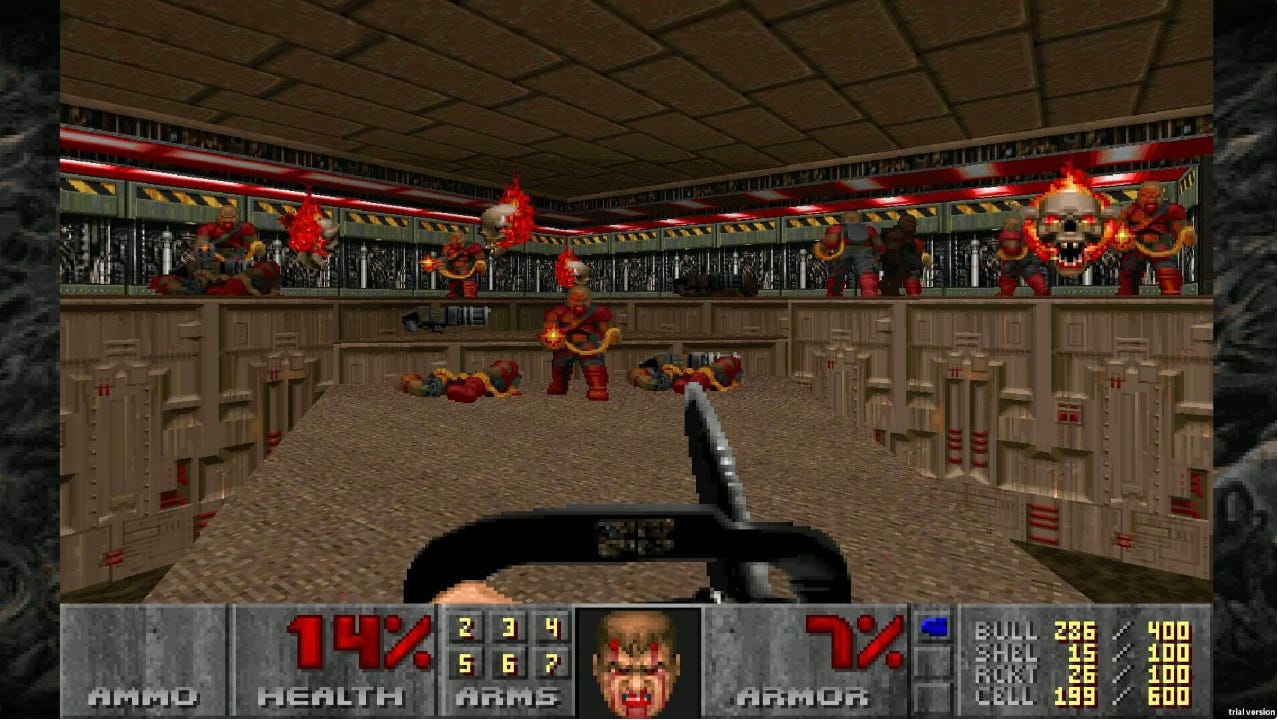Handheld PC Gaming is having its moment (for early adopters)
November 10, 2023But even if I weren’t endlessly researching the history of handheld gaming, even if I didn’t have a collection that was nearing 150 different systems dating back to the ‘70s and ranging from a playable plastic McNugget to a LEGO-designed action figure, I’d still be enthralled with what’s going on in the world of PC gaming hardware right now.
It’s shrinking.
I suppose you could blame that on Moore’s Law; technology endlessly grows smaller, faster, and cheaper, and the number of people who want to buy the tech that lets them play increasingly stunning video games is only growing larger.
So it’s an inevitability that PC gaming would eventually shrink from desktop to laptop and now from laptop to handheld.
Handheld gaming PCs have been around longer than you might suspect, but like a lot of technology, it took the right timing, the right agent of change to scootch it into the public spotlight. That came about last year when Valve, the company behind the online store with an estimated 75 percent market share of digitally distributed PC games, released the Steam Deck.
It’s a powerful little system that runs on the Linux Distribution SteamOS and — while it allows for, even supports, sideloading other stores — it is essentially a console for the Steam storefront.
It is also doing relatively well, selling an estimated 1.62 million units in 2022 and expected to surpass 3 million this year. There’s even a new OLED version of the system coming out soon.
Where systems like the Ayaneo or GPD Win catered to a niche market, the Steam Deck designed a system specifically made to tap into its massive Steam storefront user base of more than 120 million.
And then something not too surprising happened earlier this year: News of more handheld gaming systems starting bubbling up. Thanks — it seems — to the early success of the Steam Deck, chipmaker AMD found itself fielding calls from major computer manufacturers asking when the company would release a chipset specifically designed for a Windows Gaming Handheld.
Enter the AMD Ryzen Z1 and the summer release of the Asus ROG Ally. While AMD viewed the release of the system as a milestone, the first step in what it says will one day become another major facet of PC gaming (think the next laptop form factor), the company also cautioned that the system and systems like it are still in their early days.
After spending about five months with the ROG Ally, I’d be quick to agree.
As a lifelong PC gamer of a certain age, I’m used to my gear simply not working sometimes. You need to fiddle with it, mess with settings, take it apart, dig into the bios and operating system. But that hasn’t prevented the system from becoming easily my most used portable, even compared with the Switch or Steam Deck.
I deliberately waited months to write about my experiences because I knew that systems like this need to be field tested, pushed to their limits, dropped a few times. I did all of that.
I spent a month with the system in Australia, using it as my only gaming computer. I brought it on domestic and international flights, used it in cars, on trains, outside, and in. I managed to drop it in almost exactly the same way I dropped the Steam Deck. One suffered an easily fixable broken trigger, and the other seemingly survived without a mark.
After spending months poking and prodding the system, tearing it apart to swap out a hard drive, and trying to resolve the still non-functioning microSD card reader, I’ve learned much about the system, and I love it.
I spent weeks playing Diablo IV on the system, sitting next to my wife and in-laws by the living room fire during the Australian winter. The ten-hour flights there and back flew by (literally) thanks in part to the Ally and an underseat plug. On a whim during a visit to my family in Texas, I grabbed El Paso, Elsewhere, and played through hours of it, sitting on a balcony overlooking El Paso’s Franklin Mountains.
Bringing my PC gaming library with me everywhere changed how and why I played and sometimes even changed the experience of playing.
That said, I’m not sure I’d suggest the ROG Ally to anyone not willing to put in the time to make it work for them. It can be an aggravating bit of tech.
I find myself regularly hunting down setting tips on Reddit to get the most out of the system when I play games like Alan Wake 2, Diablo IV, or even Baldur’s Gate 3. There is rarely a time when I load a freshly released game where I don’t have to tinker with it before launching it for the first time.
There are even a host of little tweaks and settings you need to hunt down and change to get all of those stores running properly.
But for me, that’s the PC gaming experience. If I didn’t want to fuss, I’d stick to the Nintendo Switch or even the Steam Deck (though it can have its issues as well.)
As an aficionado of handhelds and gear and a devotee of PC gaming, I know this isn’t going to be a system I’ll be using in a few years. New entries will crowd it out; updated versions will make it feel slow. But the system is a surprisingly solid entry in a niche that couldn’t exist in any meaningful way not that long ago.
And despite its peccadillos, using it can feel like magic.
I still grin when I pick up the slender device, pop into the Epic Games Store, Steam, Xbox, Ubisoft, EA, GOG, etc, etc, and within minutes start playing chunky, beautiful PC games while laying in bed or sitting in the seat of a plane.
It feels forbidden and even — for as long as the battery lasts — luxurious.
While tech like the Asus ROG Ally and Steam Deck will surely pave the way for a third viable formfactor for PC gaming down the line, none of them are quite there yet.
Elsewhere

An ode to the chainsaw, gaming’s goriest melee weapon

The human horrors of Red Dead Redemption 2

The Invincible: Experience cosmic terror in the red glare of a dying star